Yeah, the initial set-up is historic (to a point), but after that things start to diverge, as randomness (and player input) plays an important part.
Announcement
Collapse
No announcement yet.
Norgesveldet – A history of the Norwegian kings
Collapse
X
-
Just wait till he gets to Olaf Tryvgesson (or however you spell it).
Comment
-
Yeah, he is posting the results of his video game. If you haven't played Crusader Kings 2 then you should look into picking it up on Steam. Sometimes they offer package deals where you can buy the game, the expansions, and the optional sprite packs for one discounted price. The last time I played I started as one of the last Zoroastrian counts in Persia and did ok but not great. I was able to get about 2/3rd of Persia before all the Muslims ganged up on me in a holy war. I was able to survive but lost territory and by then was to far behind in technology to really make any headway. Still, that was better than the Zoroastrians did historically. Before that I tried to play as Christian Ethiopia but I quickly got stomped by the mamaluks in Egypt.Originally posted by Bugs ****ing Bunny View PostOh I see. It's not history at all.Try http://wordforge.net/index.php for discussion and debate.
Comment
-
Who is this Olav Tryggvasson you speak of?Originally posted by Elok View PostJust wait till he gets to Olaf Tryvgesson (or however you spell it). Remember, this is entirely random after the initial start, so while I can get an Olav, I will never get just that king.
Remember, this is entirely random after the initial start, so while I can get an Olav, I will never get just that king. Do not fear, for I am with you; Do not anxiously look about you, for I am your God.-Isaiah 41:10
Do not fear, for I am with you; Do not anxiously look about you, for I am your God.-Isaiah 41:10
I praise you because I am fearfully and wonderfully made - Psalms 139.14a
Also active on WePlayCiv.
Comment
-
I always wanted to be a Pict.Any views I may express here are personal and certainly do not in any way reflect the views of my employer. Tis the rising of the moon..
Look, I just don't anymore, okay?
Comment
-
They were just another example of evil Irish colonial oppressors invading peace-loving Britain.The genesis of the "evil Finn" concept- Evil, evil Finland
Comment
-
Halfdan I the Apostle
(901-935)
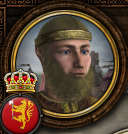
Halfdan I is well known amongst modern Norwegian, both as the king who embraced Christianity, as well as a tragic figure of which many a play has been written. His rule was a defining moment in Norwegian history, and his legacy was to haunt his successors for a long time.
Family
Halfdan was married to Gloth, of which little is known, and he had six children, of which the second son was to inherit down the line:
Budrli
Bersi
Steinn
Rögnfridr
Sveinn
Tyke
His reign
Already at start, Halfdan’s reign had signs of trouble. He finished the work his brother and father started in Ireland, with the island being united under the Norwegian crown, save a chiefdom in the east where a relative was let be independent. Trouble stirred at home though, and to keep power, Halfdan was forced to give away power to his chiefs, leading to a weaker position for the young king. Small rebellions were quickly crushed, but two years into his reign a major revolt happened in his new won province in Ireland. Halfdan assembled his host, and met the rebels in battle. The equal sized armies met, but Halfdan’s host barely lost the battle and fled north. There they met an even bigger host, as news of the success had spread and led to the rebels getting increased support.
After this second battle the Norwegian armies was all but depleted and at home unrest were brewing amongst the chiefs. When the Irish rebels got even more reinforcements and the entire island was all but under the total control of the rebels, Halfdan hired a local mercenary company in a last attempt at getting back control of the situation. However, he was captured in battle and in the Treaty of Dublin in 906 he was forced to sign off the entire island to the leader of the Irish uprising, who became the first king of a united Ireland weeks later when he invaded the independent chiefdom of Halfdan’s distant relative.
Entering a deep personal crisis following the loss of Ireland to the Catholic Irish, Halfdan began questioning if not the strength of the Catholic nations meant that their god could be the One True God after all. When a Catholic bishop in 909 asked to enter the realm and tell his court about their God, Halfdan not only allowed him to enter, but asked to be personally schooled in what this God was all about. The bishop met with great success, and in May 21st 910 Halfdan and all of his family was baptized into the Catholic Church. To the astonishment of contemporary chroniclers, most of the Norwegian chiefs agreed to follow their king and get baptized. Modern historical research has proven that Norway had had contact with Christian missionaries as early as the late 700s however, so the groundwork was already done.
Not far after, the first steps by Halfdan to implement what is known to a modern reader as feudalism, after the model of the continental kingdoms, were made. This work would take generations to complete, but the major work is reckoned to have been done already before Halfdan died. Low on money, a problem that would continue for generations due to local resistance against both the Christianization and enactment of feudalism, he borrowed money from Jewish moneylenders to build up his demesne. He also began wars against the small neighbouring chiefdoms in modern day Sweden, which all was still Norse pagan. Pleased by this, the Pope sent him huge monetary support by several occations the next few years.
At this point, the problems began to amass. The mightiest Norse kingdom, Jylland controlling most of modern day Denmark, declared war, at the same time as heathen rebels in Trøndelag rose. Days later, Halfdan’s nephew Haraldr rebelled to take the throne. The remaining vassals rally together around Halfdan, but the pagans of Finnmark rebels to seek independence. After a long and arduous campaign, the pagan rebels were put down, only to rise again weeks later. Luckily for Halfdan , Haraldr is slowly losing his war, and as both realize their common Catholic faith in Norway is in danger, Haraldr proposes a white peace. Halfdan readily accepts. Only Jylland left to beat, Halfdan’s spirits are good, but then another disaster happen: The largest pagan realm left in Scandinavia, the kingdom of Svithjod, declares war. All of Halfdan's recent marriages for political alliances now prove decisive, as the Catholics kings of Europe answers his call for help. After years of fighting, Halfdan’s allied forces wins victory on all fronts in 925. The same year, the discovery of Greenland was made known.
Filled with righteous rage against the infidel, Halfdan amasses his tribal armies in 926 and attacks Svithjod. But in a betrayal sung about by skalds for centuries thereafter, Halfdan's son in law, the king of Scotland, declares war to get control of Sudrreyjar, and Halfdan is forced to call off his attack on Svithjod after mere weeks of fighting. It takes a whole year, but finally Scotland’s armies are driven back. Halfdan is beginning to question how to deal with his far flung assets in the North Sea, however, as they are hard to protect, and his enemies in Scandinavia are many.
Back in Norway, the king faces another pagan uprising, but his armies make them pay and he renews his holy war against the pagans left in Sweden. As he feared, however, the islands in Scotland was becoming a liability, and when the petty king of Sudrreyjar, curiously enough situated in England, declared war for the control of Sudrreyjar, he quickly gave in, sources citing the need to focus on the core of the realm.
The many setbacks had become much to bear for the king, and in august 935, king Halfdan was found dead in his bed. Rumour has it he ended it himself. He had been depressed for a long time, seeing his life as a long journey of suffering. In the confusion after the sudden death of the old, but healthy king, Halfdan's son and designated heir Bersi I rose to the throne, but his brother Budrli rallied support from the Swedish provinces and declared the previously dead kingdom of Svithjod independent under his rule. For now the brothers were at peace with each other, but both eyed the other with suspicion and sharpened their swords.
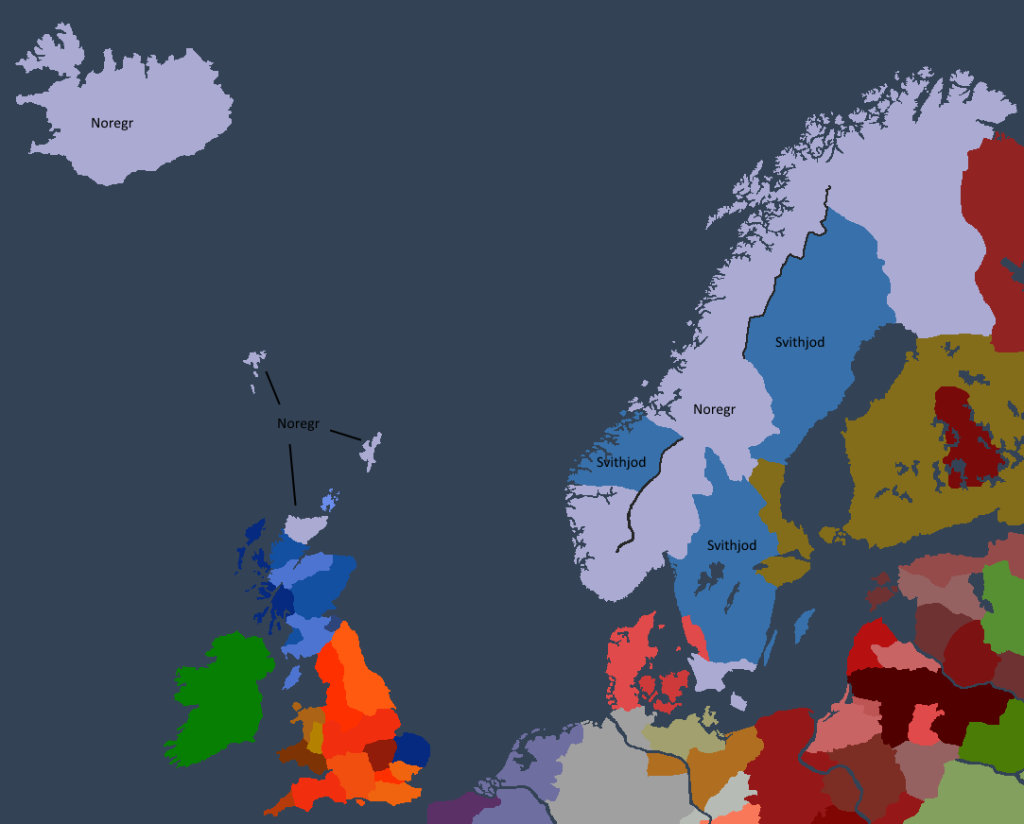
The confused situation following the death of Halfdan I, the realm divided between two brothers and with contested borders.
Aftermath
Halfdan’s reign was a long and troubled one, resulting in the loss of Ireland as well as the division of his Scandinavian empire. He was important for the future of the nation in that he instituted Christianity in Scandiavia, as the first ruler in this region. He also began the long road towards a feudalisation of the kingdom. His reign also saw the start of a decline that was to last for a long time, as both the kingdom’s income as well as manpower was severly depleted.
To modern day Norwegians, Halfdan I is well known, both as the founder of Norway’s Christian roots, but also as a deeply tragic figure.Do not fear, for I am with you; Do not anxiously look about you, for I am your God.-Isaiah 41:10
I praise you because I am fearfully and wonderfully made - Psalms 139.14a
Also active on WePlayCiv.
Comment
-
cool stuff nikolai. a good read so far. "The Christian way has not been tried and found wanting, it has been found to be hard and left untried" - GK Chesterton.
"The Christian way has not been tried and found wanting, it has been found to be hard and left untried" - GK Chesterton.
"The most obvious predicition about the future is that it will be mostly like the past" - Alain de Botton
Comment
-
-
Bersi I the Ill-ruler
(935-947)
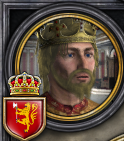
Bersi I’s reign was in general a time of decline for the Norwegian realm, and the king is often glossed over quickly when the time period is covered. His reign being in the shadow of the eventful reign of his predecessor and successor, Bersi I is not especially well known outside historians’ circles.
Family
Bersi I was married to Eleonora, a formidable woman who introduced a continental court culture to the Norwegian capital. Together they had seven children:
Iliana
Refil
Kraka
Ale
Gunnarr
Helena
Aleta
His reign
Faced with the equal of a cold war with his brother and large opposition inside his realm, where many wanted to install the pretender Haraldr as king, the first time of Bersi’s reign was a shaky one. But by bribes and diplomacy, the threat of Haraldr were removed, and Haraldr was skilfully neutralized by a promise of leading the regency if the king fell ill, along with a place on the king’s council.
Months later, promising news came from Svithjod, where an alliance of nobles had presented the king's brother with an ultimatum: Give the crown to Bersi or face rebellion! Sadly the months went by without anything happening and when push came to shove, nothing came of this. Internally however, things began to move. A month after the ultimatum in Svithjod, Bersi’s own vassals challenged his rule, naming his relative Ormr the true king. Lacking troops to counter the rebellion, Bersi hired a mercenary company and soon it was quelled. The throne was safe, but the treasury was dangerously low. Unable to take on his stronger brother's kingdom, and having a hard time keeping away plots to place other relatives on his throne, Bersi resigned to his castle.
He was soon forced out of his castle, however, as the heathen kingdom ofJylland declared war to take the province of Skåne. Unable to withstand the attack, and having a track record of poor management of his country, Bersi was now called “the Ill-Ruler” behind his back. He soon was forced to sign over Skåne to the heathen king.
Determined to strengthen his realm, even if weaker than what it was at its height, Bersi kept good relations to his brother in Svithjod and used the next years focusing on converting his realm to Catholisism. While the nobles all were Catholic by this point, the populace at large were to a large degree still heathen. The massive conversion campaigns paid off quickly enough, and soon a majority of the provinces were Catholic. Relations with the nobles were tenous though, as most of the realm still was tribal, despite the official institution of feudalism under his father.
In 945, Bersi's brother Steinn, the jarl of Jamtaland, became a threat to the throne. Steinn were by far the strongest vassal in the realm and Bersi schemed to take away his county in Oppland. This would mean that the entirety of eastern Norway would be in his demesne. Steinn refuse to give in, and a civil war ensued. By this point the king were an old and infirm man, but despite his court urging him to remain at home in the castle and letting his underlings take care of the campaigning, the king went to the battlefield. During the first battle between his army and Steinn’s, he got a heavy blow to his head and went into a coma he never recovered from. Hurredly, the appointed regent sought white peace and got it. A power struggle ensued,everyone knowing the king would soon die. Swayed by his silver tongue and winning personality, the nobles decided to vote for a distant relative of the king, a Varangian of great diplomatic clout, but little else to speak of in the matter of skills. The Varangian were also named Bersi, and when Bersi I died a month later, Bersi II was crowned king.
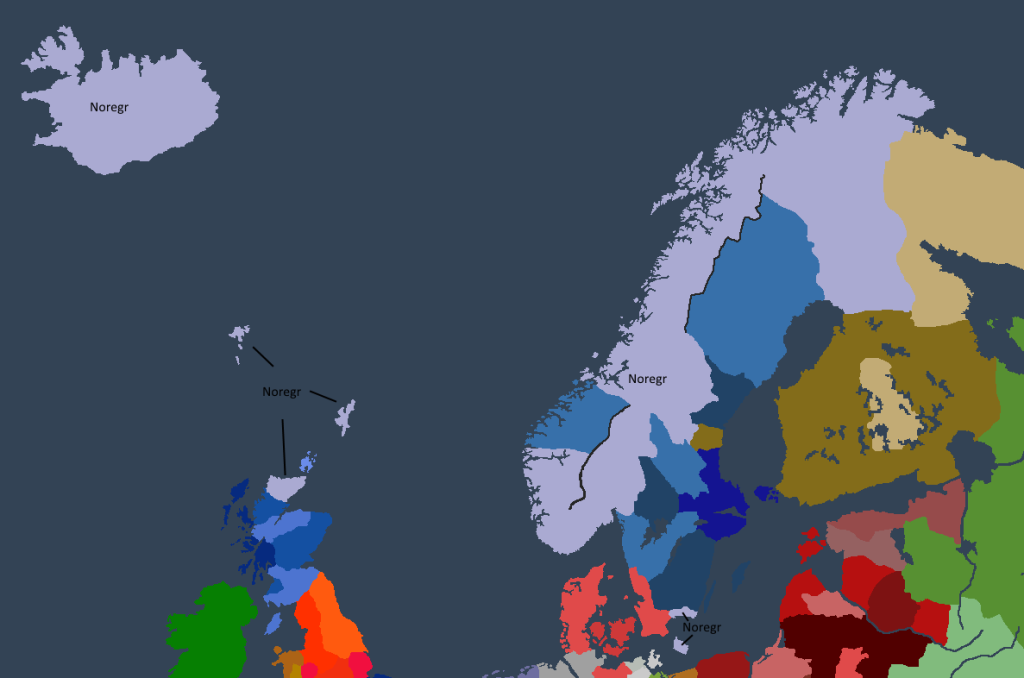
The realm at the death of king Bersi I the Ill-Ruler.
Aftermath
Bersi I’s rule was a time of continued decline. Overshadowed by both his father and his successor, he is not well known among modern Norwegians. His reign is noted by later historians as not being as bad as it has been claimed though, seeing as except the war with Jylland, he kept clear of the marked decline of his brother’s kingdom, which saw a slow loss of land to the emerging power of Suomi in the east, as well as constant crippeling rebellions. Compared to this, his reign must be seen as a relative success.Do not fear, for I am with you; Do not anxiously look about you, for I am your God.-Isaiah 41:10
I praise you because I am fearfully and wonderfully made - Psalms 139.14a
Also active on WePlayCiv.
Comment
-
good stuff. much better than the "i conquered x, then i conquered x, then there was a war against everyone; it was hard, but i won and conquered x, y and z...." AARs.
 "The Christian way has not been tried and found wanting, it has been found to be hard and left untried" - GK Chesterton.
"The Christian way has not been tried and found wanting, it has been found to be hard and left untried" - GK Chesterton.
"The most obvious predicition about the future is that it will be mostly like the past" - Alain de Botton
Comment
-
Bersi II the Just
(947-977)
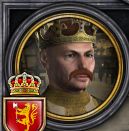
Bersi II’s reign is known as quite successful compared to his predecessor. While the territorial gains were small compared to for instance Fairhair’s, his diplomatic clout and political manouvering were superb, making for a upturn in the kingdom’s affairs.
Family
Bersi II were married twice, first to a daughter of a local noble, and later to the daughter of the Eastern Roman Empire, showing his skill in making valuable political connections. He got the following children:
Alvør
Maer
Sara
Kjartan
Skuld
Hrane
Helena
Holmfrid
Vigdis
And he also got two bastards, which would become important later in the course of history:
Borkvard
Olafr
His reign
Supported by most of the Norwegian nobles, the throne of Bersi II was secure, but soon a rebellion amongst his subject following the Norse religion was instigated. The rebel leaders wanted to reinstate the Norse religion in Norway, and when the tribe of Komi took advantage of the situation, declaring war for the Finnish parts of the realm, the situation was becoming dire. Bersi II inherited the troubles of Bersi I in having few troops and a small income, but it was slightly better due to Bersi II’s good relations with the nobles. Mercenaries were hired to take out the steamrolling rebellion, and a large victory was made, but the mercenaries left when the money was gone, and the rebellion was not yet crushed.
Focusing on winning the religious war in the south, and at the same time ridding himself of the threat of the long-time pretender Haraldr, who had his powerbase in the disputed land, Bersi let the heathens take the Finnish land and in the meantime defeated the Norse rebels. After a year of stalemate in the north, peace was made, ceding the territory to the tribe of Kola.
Meanwhile Bersi continued his nominal support of his relative in Svithjod, but refusing to send in his armies, thus keeping the rival kingdom in perpetual turmoil. Proving himself to be a good administrator, Bersi increased the crown authority as well as beginning a centralization of the realm, and after a few years, Bersi feels secure enough to try to revoke the county of Oppland. The jarl of Jamtaland was a dangerously powerful vassal. The revocation was flatly refused and once again the country was in civil war. The war was almost won when the jarl died, and the nobles withdrew their support, forcing Bersi to end the war. But with his diplomatic clout, Bersi won the nobles back over to his side, and issued the new ruler the same ultimatum his father got. War was renewed.
Politics were a tricky thing in Norway though, the nobles were afraid the king would become too powerful and in Svithjod the heathens were marching on in a big rebellion. When the jarl died, war was again ceased, with an increasingly frustrated king working in the shadows for renewed hostilities. After half a year of cajoling, another ultimatum was issued and turned down. War was again a fact. And this time, Bersi made sure the war went to its conclusion, consolidating his power. Greatly encouraged, he then tried to revoke the county of Heidmark. The count refused, but weak as he was, he lost soon thereafter. Two years later, he gained control of the jarldom of Trøndelag, when the young jarl died under suspicious circumstances.
However, following the upheavals of the institution of Catholisism, which was now widely spread, and the institution of feudalism, something few of the nobles had taken any heed to, Norwegian economy and manpower was exhaused. Norse paganism ran rampant in Denmark and southern Sweden, and neither Svithjod nor Norway could keep their lands in the south. When the powerful Danish Jyllanders came for the last county in Skåne, Bersi II decided to focus on his core lands and handed it over within months.
The heir to the throne was currently the beaten jarl of Jamtaland, Bersi's bitter rival. But when it was discovered that the jarl had been plotting against the king, he was promptly arrested and stripped of his jarldom, only keeping the two counties. He was still popular amongst the nobles, but he was for the moment not a threat. With skill Bersi manoeuvred his son into position of heir to the throne, and married him off to a Byzantine princess. A few weeks later his wife died and he promptly married the princess' sister. Having a dual connection to the strong Eastern Roman Empire, the king’s prestige and influence skyrocketed.
The elective gavelkind of Norwegian inheritance law meant that power was divided each time a king died. With his increasing control over the kingdom, Bersi II in 970 changed the law to normal elective, and at the same time increased centralization to high. With his control over the jarldoms, his choice would be king after him. His power secure, and Sweden weak after decades of war against the heathen, Bersi declared war on his relative, for the control of Trøndelag, de jure Norwegian lands. During the war, the king got a severe depression, after he slew his kinsman the king of Sweden in close combat. This depression was to haunt him on and off for the rest of his reign.
Even in a depressed state however, the king were still a skilful diplomat. Shortly after the war with Svithjod was over, his nobles present an ultimatum: Institute inheritance by primogeniture. The king agreed, and modern historians have found evidence it was he who was the spider behind it, afraid another inheritance law change would anger his subjects too much, he manipulated them to themselves suggest the law change, manipulating them to his end. A year later the king was found dead in his bed, rumours having it he ended his own life. His eldest son Kjartan was raised to the throne without much issue.
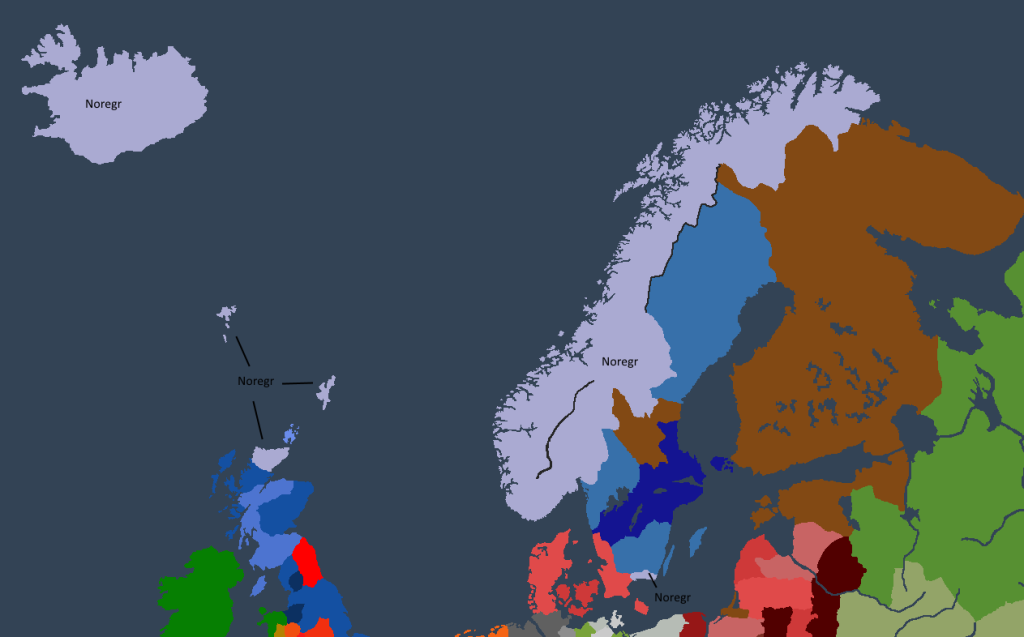
The kingdom of Norway on the death of Bersi II.
Aftermath
Bersi II was a highly successful king who greatly improved his kingdom’s prestige and influence. Military he had mixed success, but he left his kingdom in a much stronger position than he got it. He ranks among the most popular of the medieval Norwegian kings amongst the modern Norwegian audience.Do not fear, for I am with you; Do not anxiously look about you, for I am your God.-Isaiah 41:10
I praise you because I am fearfully and wonderfully made - Psalms 139.14a
Also active on WePlayCiv.
Comment
-
If 6ou have the old gods expansion pack then I think you made a mistake converting. The best thing about playing a Viking power is getting to attack Christians and other Pagans at will and you strengthen your religion by sacral icing prisoners to the Norse gods. Given that prisoners generally just pile up it puts them to good use. The only ones worth saving are the females with high stats or feudal claims; those ones you just force to become your concubine then invade and put your bastard son in power where ever his mother came from.
The rest you either sacrifice to Odin or ransomed them of you need gold.Try http://wordforge.net/index.php for discussion and debate.
Comment
Comment